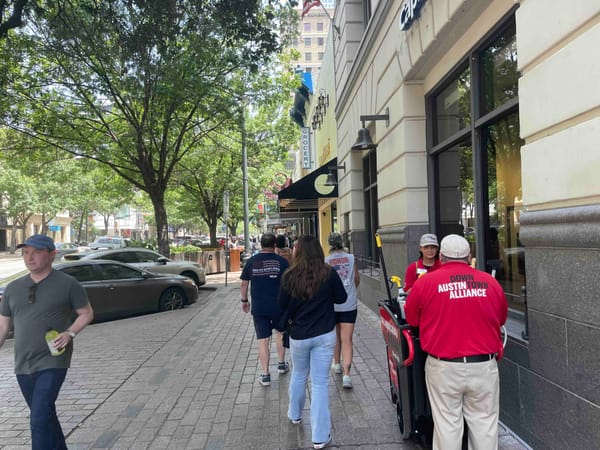Lives lost, lives saved
A paramedic describes a day of overdoses.

Thank God for Narcan
Selena Xie, president of the Austin EMS Association, wrote the following about the experience of responding to the dozens of opioid overdoses reported Monday.
It's hard to really understand what days like April 29 are like for first responders.
On a good day, EMS is exceptionally busy. That day, during the UT protests, we sent three ambulances and our ambus to take care of students, bystanders, and other first responders who were injured, pepper sprayed, and dehydrated. It was also a very hot day so we staged a cooling area as well.
By 10 a.m. it had also become clear that we were dealing with a serious overdose situation. Three ambulances were needed just to address a large number of overdoses in one alley downtown.
Some of the patients had already been treated by bystanders, who had fortunately been provided with Narcan, the drug that reverses overdoses, by harm reduction advocates and our Community Health Paramedics. However, these overdoses required more narcan than usual to reverse. All the patients were in critical condition and required advanced life saving treatment. One died. As they were leaving, bystanders were yelling about overdoses in other alleys, prompting more ambulance responses.
The entire Integrated Services team started working on the overdose outbreak, some of them building more narcan kits, some heading downtown.
In the afternoon, overdoses started picking up in South Austin in certain hot spots, where at least three more people would die and our paramedics would throw out narcan to civilians to revive a number of people overdosing in a parking lot.
We ended up giving out 200 narcan kits that day and putting on impromptu training on how to use it. The harm reduction strategy of distributing narcan to the community saved lives that day. I am personally grateful for all the training that medics and other first responders get. With over 50 overdoses and four confirmed deaths, I know that over a dozen people would have died if not for the quick thinking and action of all of our first responders on Monday. For that I am grateful.
City seeks tenants
Last week Foxtrot, a national convenience store/coffee shop chain, announced that it was abruptly shutting down all of its stores, including the one that has operated for less than a year at Austin City Hall.
I never vibed with the City Hall Foxtrot. I didn't have much interest in its overpriced menu, and its limited indoor seating prevented it from becoming nearly as much of a city gubmint social hub as Austin Java, which occupied the same space for years before closing down in the early days of the pandemic. Jo's Coffee, a half block to the east on 2nd St., offers a far superior atmosphere.
Anyway, I hope the city soon gets a new tenant. 2nd Street –– thanks in no small part to infrastructure investments financed by a (gasp!) Tax Increment Reinvestment Zone –– is a shining example of classic urbanism: the wide sidewalks, the trees, and above all else, the blend of uses: restaurants, retail, entertainment, and civic spaces.
A spokesperson for the city's financial services department, which oversees the leasing of city-owned spaces, told me that the city is in the process of coordinating with Foxtrot to "surrender the space," after which it would begin looking for a new tenant. Ability to pay is far from the only consideration.
"Factors beyond rent play a crucial role in our evaluation," said Kimberly Moore. "We assess proposals comprehensively, including but not limited to local preference, revenues, experience, fit, pay/benefits, expansions, and menu/pricing. This framework is subject to adjustments should we re-enter the market soon."
Similarly, hopefully business will soon return to the Central Library's cafe space, which has been vacant for months. Fortunately, the library remains a stunning public space even in the absence of the Cookbook Cafe.
Moore said the department has not identified any "long-term tenants" for the library space but are "working diligently to identify a vendor."
"In the meantime," she added, "we are working [on] providing temporary food truck vendors as a service."
Here's another idea for integrating public and private spaces: Many apartment developers have a hard time finding profitable retail tenants for their ground-floor spaces. The city has sought –– through the Vertical Mixed Use density bonus –– to encourage mixed-use developments but the sad reality is that on many of our made-for-car corridors, there is not enough foot traffic to support standalone retailers.
What if the ground-floor retail in some cases could be a public space, like a small library? It's not going to work out in most instances, but there may be a situation where the stars align.
If somebody forwarded you this email, please consider subscribing to the newsletter by visiting the website.





